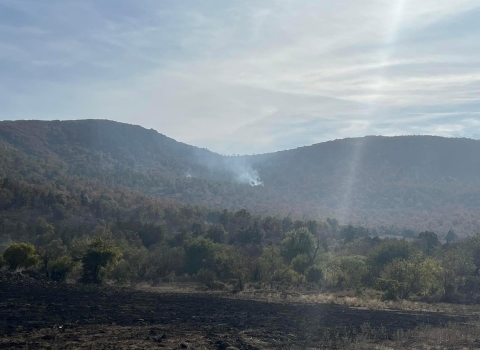DENVER – The U.S. Fish and Wildlife Service (Service) is releasing the final environmental assessment (EA), finding of no significant impact and findings document related to the issuance of an incidental eagle take permit for the Dunlap Wind Energy Project (project) located southeast of the Freezeout Mountains and southwest of the Shirley Basin in Carbon County, Wyoming. The 30-year permit authorizes the potential take of bald and golden eagles associated with the operation of the existing 74-turbine wind energy project, and outlines required conservation and compensatory mitigation measures for minimizing and offsetting potential eagle take.
Pacific Power’s parent company PacifiCorp committed to implementing avoidance and minimization measures, compensatory mitigation actions and post construction monitoring as outlined in their the eagle conservation plan (ECP). These conservation measures are designed to avoid and minimize impacts to eagles and are available for public reference.
The EA analyzed the risk of bald and golden eagle take and potential impacts of issuing an incidental eagle take permit associated with operation of the project. The project area covers approximately 10,347 acres. PacifiCorp owns most of the acreage, with the exception of 640 acres owned by another private entity and 640 acres that are State of Wyoming lands leased by PacifiCorp for 35 years. The project started operation in 2010 and is expected to operate through 2049.
The Bald and Golden Eagle Protection Act prohibits the “take” of bald and golden eagles without an eagle take permit. “Take” means to pursue, shoot, shoot at, poison, wound, kill, capture, trap, collect, destroy, molest or disturb an eagle. In 2009, the Service published a final rule authorizing take of eagle nests and the incidental (non-purposeful) take of eagles associated with an otherwise lawful activity.
The eagle take permitting regulatory process enables the Service to work collaboratively with industry to avoid and minimize eagle deaths, mitigate for golden eagle take that does occur and gather essential information about eagles that will help to maximize eagle conservation across the nation.
The draft EA for this project was made available for public review and comment in October 2020, and the Service received two public comment letters. The comments were assessed and did not result in significant changes to the final environmental assessment.
For specific questions, please contact Rob Doster at dunlap@fws.gov.
The mission of the U.S. Fish and Wildlife Service is working with others to conserve, protect, and enhance fish, wildlife, plants, and their habitats for the continuing benefit of the American people. For more information on our work and the people who make it happen in the West, visit our website, or connect with us through any of these social media channels: Facebook, Twitter, Flickr, YouTube, and Instagram.



